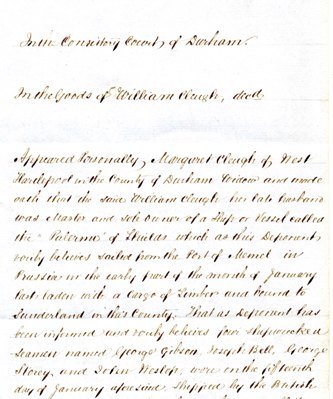
The wreck of the Palermo
This is the affidavit of Margaret Cleugh, the widow or relict of William Cleugh of West Hartlepool in County Durham. It reveals the bare bones of the story of the loss of the barque Palermo of which William Cleugh was both master and owner. The Palermo was a 315 tonne 94-foot barque, built at Sunderland in 1844 and carrying a crew on its last voyage of some 11 men. This 1857 affidavit and its associated records are found right at the end of the long series of probate records of the diocese of Durham that stretch from the 16th century until 1858 when testamentary jurisdiction passed from the ecclesiastical courts to the newly established civil District Probate Registries around England and Wales. As is typical in cases of intestacy, the Durham probate records include an administration bond relating to Cleugh's estate (DPRI/3/1857/A98/1), and an affidavit of the administrator's sureties (DPRI/1/1857/A98/2) stating their capacity to guarantee her liability for the total value of the penal sum on the bond, usually twice that of the value of the deceased's estate. A little less typical is the additional existence of what is termed a 'Schedule or declaration instead of an inventory' of the deceased's goods (DPRI/1/1857/A98/3) and a detailed affidavit made by the administrator (DPRI/1/1857/A98/4-6) which explains the circumstances of William Cleugh's death.
Many ships with their crews in this period sailed from north-eastern ports and were never heard from again; a hard blow for the loved ones they left behind. From the nineteenth century, however, such disasters were recorded in more and more detail, leaving historical records for descendants and historical researchers to find. We might think that the North Sea - then also called the German Sea - and covering some 222,000 square miles was not a completely trackless empty place, but the experience of the Palermo's crew speaks otherwise. Nevertheless, in this case more information relating to the wreck was forthcoming at the time than was commonly discovered, and we are lucky enough to have some of that information recorded second-hand in the Durham probate documents, records that were required by the probate authorities in order to grant to Cleugh's widow the administration of his estate.



